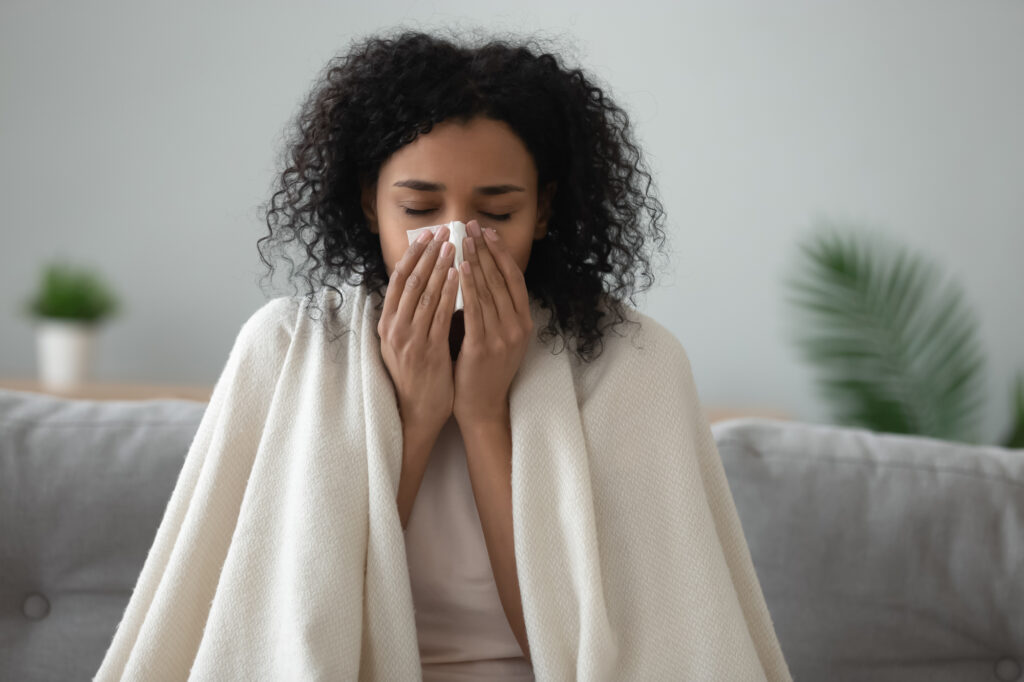Influenza or “the flu” is a seasonal illness that typically strikes in the fall and winter months. Why? When it’s cold outside, people are more likely to mingle indoors with the windows closed, which decreases ventilation and air flow. Air flow and maintaining an adequate physical distance are essential to slowing the spread of viral respiratory illnesses like COVID and the flu.
Staying indoors with a group or groups of people increases your risk of contracting a viral infection through tiny respiratory droplets expelled while talking, coughing, sneezing or even breathing.
The flu is a viral infection that attacks your respiratory system (nose, throat and lungs). Symptoms range from mild to severe and often include fever, chills, muscle aches, cough, congestion, runny nose, headaches and fatigue.
Now that summer is here, you’re probably feeling less cautious about contracting the flu, but should you be letting your guard down? Can you get the flu in the summer? The answer may surprise you.
Can you get the flu in the summer?
Though the influenza virus survives better during colder, drier seasons (October to May), it does not completely disappear in warmer, more humid seasons (June to September), so it’s possible to catch the flu in the summer months. However, flu-like symptoms during warmer, drier months are more likely to have different viral causes, including:
- Enterovirus
Enterovirus is a viral infection that spreads easily in hot weather. It may cause cold-like symptoms or severe respiratory infection. Symptoms include congestion, runny nose, cough, sore throat and sometimes a rash or pink eye (particularly in children). - Parainfluenza
Parainfluenza is a milder respiratory illness that spreads from spring to fall. Occasionally it can lead to secondary illnesses like croup (in young children), secondary bronchitis and pneumonia. Symptoms include fever, cough, runny nose and labored breathing. - Coronavirus
Though COVID-19 is top of mind, there are actually many different kinds of coronaviruses that can cause typical cold symptoms. - Adenovirus
Adenoviruses are a group of common viruses that infect the lining of your eyes, airways, lungs, intestines, urinary tract and nervous system. Symptoms include sore throat, bronchitis, pneumonia, diarrhea, pink eye and bladder infection. - Insect-borne illnesses
Insect-borne illnesses can mimic flu symptoms and include Zika Virus, Lyme Disease, Dengue Fever, Malaria, West Nile Virus and Yellow Fever.
How to treat summer flu-like symptoms at home
Here are a few home care techniques that may help alleviate flu-like symptoms. If symptoms persist or worsen after a few days (or longer), visit your nearest urgent care center for medical attention:
- Over-the-counter pain relievers (e.g., Ibuprofen, acetaminophen)
- Over-the-counter cough suppressants and decongestants (e.g., Sudafed, Delsym, Mucinex)
- Drink plenty of clear fluids to stay hydrated (e.g., water, apple juice, lemonade, sparkling water)
- Try warm liquids like tea or broth to soothe a sore throat
- Use a humidifier to add moisture into the air, which will loosen congestion and make it easier to breathe
- Inhale warm steam to help loosen mucus and ease inflammation in the sinuses and throat
- Avoid spicy, fatty or oily foods that may upset the stomach
How to avoid summer flu-like illnesses
As summer gets into full swing, it’s important to remain cautious and reduce your chances of becoming ill. Though there’s no fool-proof way to prevent yourself from getting sick, there are a few ways you can lower your risk:
- Fortify your immune system
Maintain a well-balanced nutritional diet of fresh fruits and vegetables, whole grains and lean meats. You can also take supplements that contain immune-boosting natural remedies. - Sleep at least 7 hours each night
Getting enough sleep is essential to resetting the immune system each day so it can function properly. - Wash your hands often
It’s important to wash away germs, bacteria and other pathogens after using public restrooms or other public spaces and before eating to prevent illness. According to the Centers for Disease Control and Prevention, the simple act of regular handwashing can prevent about 30% of diarrhea-related sicknesses and about 20% of respiratory infections. - Avoid people who are sick
If you know someone has a cold, avoid interacting with them until they are free of symptoms. If you get close to someone who is sick, be sure to wash up quickly afterward to avoid illness.
If you have flu-like symptoms and want to be certain it isn’t something different or more serious, visit your local urgent care for immediate attention and diagnosis. Some viral illnesses can last from a few days to a week or two. Severe infections may last longer and cause lingering symptoms, like a persistent cough.
Whether it’s a cold, flu or something more severe, if your symptoms do not improve (or they get worse), visit Thibodaux Regional Urgent Care – Thibodaux to get the care you need to feel better and avoid secondary infections like pneumonia and bronchitis. Also, be sure to visit a local urgent care if you’re experiencing severe flu-like symptoms like persistent or severe fever, painful swallowing, persistent or severe cough or persistent or severe congestion or headaches.
Our center is open for walk-in appointments 7 days a week from 9 a.m. – 8 p.m.




